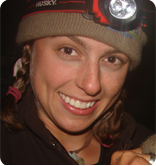Learn > Seminars and Podcasts > Presenter Biography

Christina Zdenek
Christina N. Zdenek is a wildlife biologist. At a very basic level, she loves nature and therefore feels pained to see it over-exploited or destroyed. On a deeper level, her experiences and many years of education have led her to understand the dire consequences of such over-exploitation. In short, Christina’s belief is that healthy and resilient ecosystems not only allow wildlife to thrive but also provide life-sustaining services for humans, including clean water and air, quality soils, shore and flooding protection, as well as climate-moderation. Therefore, the underlying motivation for her work is to secure resilient ecosystems for the health and well being of both wildlife and humans.
From the age of eight, Christina’s main goal was to be the best competitive basketball player she could be. Having received a ‘full-ride’ scholarship at the University of California, Irvine, her life seemed on-track to achieving that goal. However, at the age of 23, she began to feel something was missing. She felt like she was in a constant state of catch-up, unable to maintain a job or a consistent experience in conservation biology, her other passion. While appreciative for everything the sport did to help shape her life and character, Christina finally made the tough decision to change her focus from basketball to wildlife conservation.
Upon completion of university, her next step was to move to Australia to carry out her Fulbright Fellowship from the U.S. government. After some pre-thesis employment with a travelling venomous snake education company, she jumped into the deep end of some well-needed wildlife conservation research and studied the elusive Palm Cockatoo on Cape York Peninsula (far north Queensland). She worked with this iconic species for two hard-years, 11 months of which involved living out in the bush, adjacent the rainforest in a minimalistic, two-walled shelter-shed, in true field-biology fashion.
Her next step, upon completing her Masters research thesis, is joining forces with the Tambopata Macaw Project in Southeastern Peru to climb 40m-high trees and work with the gorgeous rainforest Macaws. After that, she will go wherever the conservation wind blows!
































